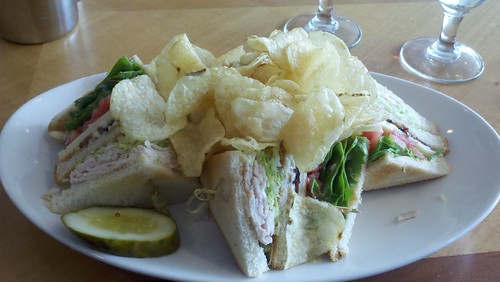James Crawford delivered his keynote remarks in the afternoon once his delayed flight arrived. His session was also streamed live and archived.
My twitter stream for the morning was filled with posts from Tracks A: Information Discovery & Search, B: Web Presence & Experience, and E: Internet@Schools. I tried to complement by attending and tweeting Track C: Communities and Collaboration. Highlights from the tracks morning sessions included Madeline Barratt, Libraries Strategy & Performance Manager for the London Libraries Consortium. She talked about the challenges and opportunities of providing library services to users as a consortium in London. These included the geographic and financial challenges and opportunities related to staff training and development. I found it interesting when Barratt mentioned they were working to improve use of their electronic resources before cutting them for non-use. Generally we look at the (often unreliable) use statisitcs for a database and decide it should be canceled. On the flip side, we also cling to the notion that an academic library (in my case) should have resource X because that's what you do. I found it interesting to turn that concept on its head and consider the lack of use may be a failure on our part to make our users aware of its availability. I'd actually take that a step further and say that we fail to make library faculty and staff aware of its availability and potential application for library instruction, reference, etc.
Barratt noted that one of the goals of this consortium related to the notion that libraries provide a vital lifeline and by joining together libraries would remain vibrant and central to community and lifelong learning. I found the London Library Consortium presentation interesting as it reflects the challenges and opportunities at my current institution, Penn State. Penn State is "one university, geographically dispersed". We are not a consortium, but the challenges of delivering materials across a large state, negotiating reasonable and affordable database licenses, serving a diverse population, and training were very familiar. Barratt's discussion of stakeholders concerns with lending their materials across libraries leaving their shelves empty has not materialized. No one library has ended up without books and the collections still remain more or less balanced. A few Penn State campuses are experimenting with floating collections. In this scenario a book sent to a campus library upon return is not shipped back to the owning library but stays at the library it is returned. It is going to take us a while to really understand what this might look like and how it will affect our collection, but I have a sense that the London model may be an indication that everything would be okay.
The other session I was very interested in was on on faculty collaboration: Digital Commons@ILR – Cornell University by Jim DelRosso. I particularly enjoyed his Prezi slides and learning more about his project. One of the gems from his presentation was the notion that "assessment is critical." While it is important we "don't overvalue anecdotes", we also need to be sure we "don't undervalue stories." At one point Jim indicated a key to faculty collaboration success has been making it so the faculty do nothing. I wondered how this was collaborative, so I asked Jim to clarify this statement after the session. We had a great conversation about how there are always faculty who will not be interested in this type of project and it is a success if you at least get them to provide you with a CV listing publications. As we talked further about the liaison approach to building the repository, I interpreted the approach to collaboration to be very similar to the approach development officers take: building the relationship, creating the comfort level, then doing the ask. Once you've been successful in developing that relationship, the donor will often bring their friends, or offer to throw parties or sponsor events so others can give. This is where the true collaboration comes in. I'm glad I asked my question.

I ate a quick lunch (turkey club) at the hotel restaurant. A librarian dining alone kept talking to the librarian also dining alone at the next table. At one point librarian A tells librarian B that she is anti-ereader because she prefers to touch and smell the books and they are yet another thing to contribute to her bad eyesight.
After lunch I had a call with a colleague about an upcoming ACRL event at the conference in Philadelphia. An hour later I also participated in the ALA Executive Board's monthly conference call. Our spring board meeting is in about two weeks. I'm looking forward to a full agenda and maybe even an outcome or two.
In the evening I attended one of the Dine-Arounds. Seven of us went to Ruth Chris Steakhouse. Although our prescribed conversation topic was "Trend Watching & Environment Scans", we talked about the conference, Washington, D.C., and our local libraries.
yummy ! Feeling hungry
ReplyDeleteDoes it bother you that the panel was all male when there are so many tech leaders in our profession who are female? It bothers me.
ReplyDeleteMichael, that's a good question. I actually talked with Roy Tennant and Stephen Abram about this very thing. They were and are well aware that this was a failure on their part. The ebooks panel on Tuesday featured a full panel of women.
ReplyDelete